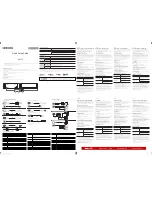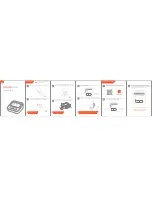
11
User Information
Stocking
In order to maximize product life, maintain a constant and
proper product temperature from the time the product is
received through storage, preparation and display.
Products should not be placed in merchandisers until
all refrigeration controls have been adjusted and
merchandisers are at proper operating temperature. Care
should be taken to place the bakery trays all the way to the
front of the shelf. This avoids blocking the rear refrigerated
air discharge. The load limit decals are affi xed to the interior
of the merchandiser. Again,
air discharge and return
air
fl ow must be unobstructed at all times to provide
proper refrigeration.
There is also a row of vents located at the base of the
front glass, just above the front rub rail. These vents allow
a gentle air fl ow across the front glass from the ambient
fans that prevents any condensation on the glass.
Do Not
place any signs or other restrictive objects on the front
of the merchandiser that will block these vents.
Care and Cleaning
Long life and satisfactory performance of any equipment
is dependent upon the care it receives. To ensure long
life, proper sanitation and minimum maintenance costs,
merchandisers should be thoroughly cleaned, all debris
removed and the interiors washed down, weekly.
Do Not use HOT water on COLD glass surfaces.
This can cause the glass to shatter and could
result in personal injury. Allow glass
fronts, ends and service doors to warm
before applying hot water.
Exterior Surfaces -
The exterior surfaces must be
cleaned with a mild detergent and warm water to protect
and maintain their attractive
fi nish.
Never use abrasive
cleansers or scouring pads.
Front Glass -
DO NOT use the front glass as a
support during cleaning. Removal of the glass is NOT
recommended.
Interior Surfaces -
The lower display decks are removable
by sliding open rear drawer and lifting them up and out.
The interior surfaces may be cleaned with most domestic
detergents, ammonia based cleaners and sanitizing
solutions with no harm to the surface.
Shut off fan during cleaning
Important Steps
1. For temperature settings, please see the SHVSS
technical data sheet.
2. Temperature control should be by means of a
T-STAT and Suction Stop Solenoid at each case.
Do not use EPR valves, Liquid Line Solenoids or
electronic control devices of any kind, as these
allow temperature swings causing dehydration and
excessive energy consumption.
3. Product should be worked and rotated on a regular
basis, not to exceed a 4-hour period.
4. At night, turn off case lights and cover the product
with a damp (not wet) cloth similar to cheese cloth
(etc.). This should be washed out in the morning and
kept in a walk-in box during the day so that it is cool
and moist when covering the product.
5. Discharge air temperature should be approximately
26°F, with between 150-200 FPM air velocity. Do not
display product directly within the air discharge.
6. Clean Humidity system a minimum of every 90 days
for proper system operation.
Case Cleaning
CLEANING PRECAUTIONS
When cleaning:
•
Do not use high pressure water hoses
•
Do not introduce water faster then waste outlet can drain
•
NEVER INTRODUCE WATER ON SELF CONTAINED UNIT
WITH AN EVPORATOR PAN
•
NEVER USE A CLEANING OR SANITIZING SOLUTION
THAT HAS AN OIL BASE (these will dissolve the butyl
sealants) or an AMMONA BASE (this will corrode the
copper components of the case)
•
TO PRESERVE THE ATTRACTIVE FINISH:
•
DO USE WATER AND A MILD DETERGENT FOR THE
EXTERIOR ONLY
•
DO NOT USE A CHLORANITED CLAENER ON ANY
SURFACE
•
DO NOT USE ABRASIVES OR STEEL WOOL SCOURING
PADS (these will mar the finish)
CAUTION
Do Not Use:
• Mineral oil based solutions, as these will dissolve
the butyl sealants used in the construction of the
merchandisers.
• Abrasive cleansers and scouring pads, as these will
mar the fi nish.
Do:
• Remove the product and all loose debris to avoid
clogging the waste outlet.
• Thoroughly clean all surfaces with soap and hot
water.
Do NOT use steam or high water pressure
hoses to wash the interior.
These will destroy the
merchandisers’ sealing causing leaks and poor
performance.










































